History of Psychology
Psychology, the study of mind and behaviour, has its roots in ancient civilizations, and its journey spans thousands of years. The evolution of psychological thought reflects both cultural beliefs and scientific advancements, highlighting the shift from supernatural explanations to a scientific understanding of the human psyche.

History of Psychology (Feldman)
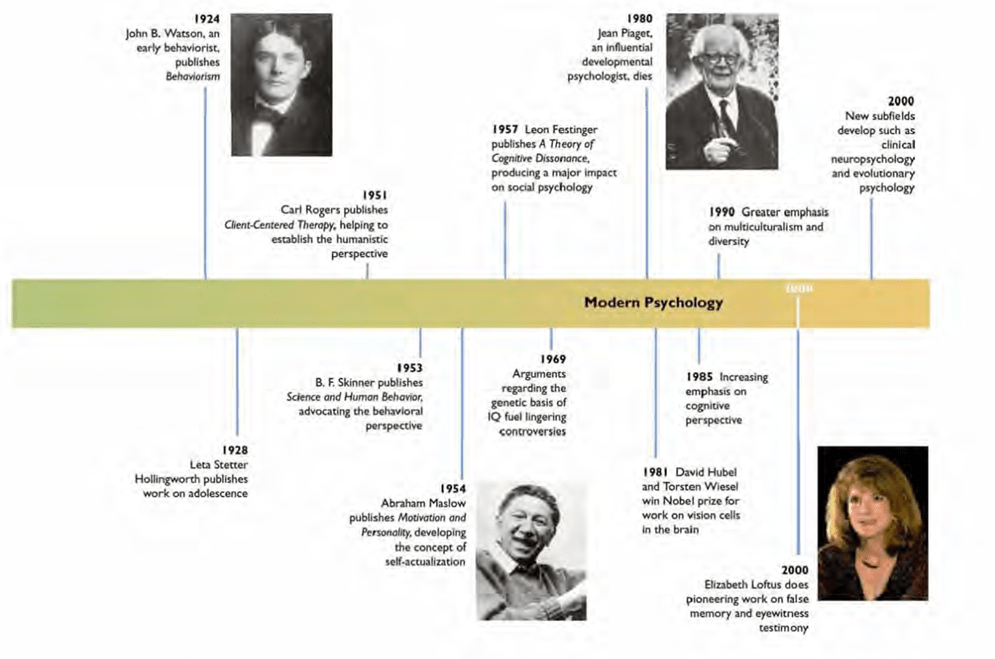
History of Psychology (Feldman)
Greek Philosophers and the Foundations of Psychology
The roots of psychology can be traced back to ancient Greece, where philosophers such as Plato (427-347 BCE) and Aristotle (384-322 BCE) laid the groundwork for Western thought about the mind and behaviour. Plato, a student of Socrates, believed in the existence of an eternal soul and proposed that knowledge is innate, meaning that humans are born with knowledge that unfolds over time. In contrast, Aristotle emphasized empirical observation and argued that knowledge comes from experience. His book De Anima (On the Soul) is considered one of the first systematic works on psychology.
Hippocrates, the father of modern medicine, also made significant contributions to early psychological thought. He proposed the theory of the four temperaments, which linked personality traits to bodily fluids or “humours.” According to Hippocrates, an imbalance of blood, yellow bile, black bile, or phlegm could lead to psychological disturbances.
The Middle Ages and Supernatural Beliefs
During the Middle Ages, psychological understanding regressed significantly due to the dominant influence of the Church over intellectual and medical thought. Mental illness was often perceived through the lens of religion, seen as a manifestation of sin, moral failings, or even demonic possession.
The Church viewed psychological disorders as signs of spiritual corruption rather than medical or natural phenomena. As a result, treatments for mental illness in this period were primarily religious in nature, focusing on driving out evil forces thought to be responsible for the symptoms. Exorcisms, prayer, and religious rituals became the most common methods used to treat those suffering from mental disturbances, with priests and religious leaders acting as the primary healers.
In more severe cases, individuals were sometimes subjected to physical punishment or confinement, as it was believed this would cleanse their souls or punish the devil within. These supernatural beliefs and practices reflected a widespread fear of mental illness and an absence of scientific inquiry. The lack of understanding of natural causes for mental disorders meant that individuals experiencing psychological symptoms were often stigmatized, ostracized, or even persecuted, further isolating them from effective treatment or compassionate care.
The Renaissance and the Scientific Revolution
The Renaissance (14th-17th centuries) saw a resurgence of interest in the natural world and human experience. Philosophers and scientists began questioning traditional explanations of mental illness. One of the most influential figures of this period was the French philosopher René Descartes (1596-1650).
Descartes proposed the concept of dualism, the idea that the mind and body are separate entities. He believed that the mind was a non-physical substance responsible for thought and consciousness, while the body functioned like a machine. Descartes also theorized that nerves were hollow tubes through which “animal spirits” travelled, transmitting information between the body and brain, much like water flowing through a pipe. Although his ideas about nerves were incorrect, his emphasis on the distinction between mind and body influenced later psychological thought.
Phrenology and Early Theories of Personality
In the late 18th century, Franz Josef Gall, an Austrian physician, developed the theory of phrenology, which claimed that a person’s intelligence, character, and personality could be determined by the shape and size of their skull. Gall argued that different mental faculties were localized in specific areas of the brain, and these areas could be measured by feeling for bumps on the skull. Although phrenology was later discredited, it was one of the earliest attempts to link physical structures in the brain to behaviour and personality.
The Birth of Modern Psychology
The formal establishment of psychology as a scientific discipline began with Wilhelm Wundt in 1879, when he founded the first experimental psychology laboratory at the University of Leipzig in Germany. This marked the beginning of psychology as an independent field of study. Wundt’s approach, known as structuralism, focused on breaking down mental processes into their most basic elements to understand the structure of conscious experience.
The goal was to analyse sensations, thoughts, and feelings in a scientific manner, akin to the way chemists broke down compounds into elements. To study these elements, Wundt employed a method called introspection, where trained participants would reflect on their inner experiences in response to controlled stimuli. Through this, Wundt aimed to uncover the building blocks of the mind, like thoughts, sensations, and perceptions.
Despite its pioneering role in establishing psychology as a formal science, structuralism faced criticism, particularly for its reliance on introspection, which was seen as highly subjective and unreliable. As different people reported varied experiences under similar conditions, the approach lacked consistency. Nevertheless, Wundt’s structuralism was pivotal in laying the groundwork for experimental psychology and in establishing a methodical approach to studying human consciousness.
In contrast to Wundt’s structuralism, William James developed the school of functionalism in the United States during the late 19th century. Functionalism focused on the purpose of mental processes rather than their structure, asking why mental processes exist and how they help individuals adapt to their environment.
James believed that consciousness was not a static collection of elements, but rather a continuous flow, which he famously described as a “stream of consciousness.” He argued that mental activities such as thinking, feeling, and remembering evolved to serve practical functions, helping individuals navigate the demands of their surroundings.
Unlike structuralism, which sought to dissect consciousness into parts, functionalism was concerned with understanding the function of mental processes in enabling adaptive behaviour. James’s work led to a broader, more dynamic understanding of the mind, paving the way for later theories that emphasized the role of cognition and behaviour in adapting to changing environments.
His seminal book, The Principles of Psychology (1890), provided a comprehensive framework for studying the mind and behaviour, influencing future psychological approaches like behaviourism and applied psychology. Functionalism’s emphasis on real-world applications and adaptation left a lasting legacy in the development of modern psychology.
Psychoanalysis, founded by Sigmund Freud in the late 19th century, revolutionized the understanding of human behaviour by focusing on the role of unconscious forces in shaping thoughts and actions. Freud’s theory posited that much of human behaviour is driven by unconscious desires, memories, and conflicts, often originating in childhood experiences.
Through techniques like free association, dream analysis, and transference, Freud believed that individuals could gain insight into these unconscious conflicts and alleviate psychological distress.
Central to psychoanalysis is the idea of the mind being divided into three components: the id, ego, and superego, which interact to balance primal urges with societal norms. While Freud’s ideas have been critiqued and modified over time, psychoanalysis laid the foundation for modern psychodynamic therapies and has profoundly influenced fields such as psychotherapy, literature, and cultural theory.
Neo-Freudians
The Neo-Freudians were a group of psychologists who built upon Sigmund Freud’s psychoanalytic theories but diverged from his emphasis on sexual drives as the primary force shaping personality. Key figures like Carl Jung, Alfred Adler, Karen Horney, and Erik Erikson focused more on social, cultural, and interpersonal factors. Jung introduced the concept of the collective unconscious and archetypes, while Adler emphasized the role of social interest and the drive for superiority. Horney challenged Freud’s views on female psychology, proposing that social and cultural influences shape personality. Erikson expanded Freud’s developmental stages, highlighting psychosocial development across the lifespan.
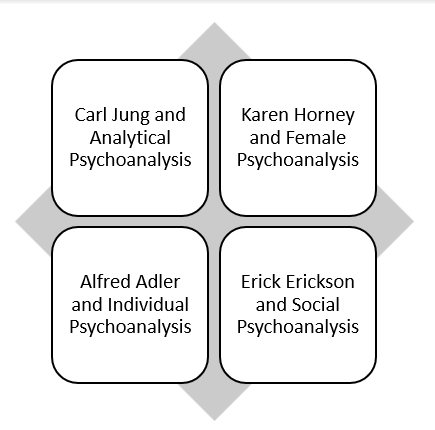
Neo-Freudians
- Behaviourism
Behaviourism emerged in the early 20th century as a major school of thought in psychology, emphasizing the study of observable behaviour over internal mental processes. Founded by John B. Watson, behaviourism rejected introspection and subjective reports, focusing instead on how environmental stimuli influence behaviour. Watson believed that psychology should be a purely objective science, based on observable and measurable events. He argued that behaviour is learned through conditioning and that individuals are shaped by their experiences.
This approach was further advanced by B.F. Skinner, who introduced the concept of operant conditioning, where behaviour is strengthened or weakened by its consequences, such as rewards or punishments. Skinner conducted experiments using animals in controlled environments, demonstrating how behaviour could be modified through reinforcement.
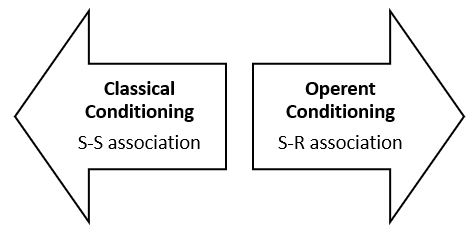
Classical and Operent Conditioning
Behaviourism had a profound impact on psychology, particularly in areas like learning and behaviour modification. It also laid the foundation for applied behavioural therapies used in education, therapy, and behaviour management. However, it faced criticism for ignoring internal cognitive processes like thoughts, emotions, and motivations, which are also crucial for understanding behaviour.
Despite this, behaviourism’s focus on empirical evidence and observable outcomes made it a dominant force in psychology, influencing practices in both research and applied settings for much of the 20th century.
- The Cognitive Revolution
By the mid-20th century, psychology had expanded into new areas. The cognitive revolution of the 1950s and 1960s shifted the focus from behaviour back to the mind. Cognitive psychology emphasized understanding mental processes such as perception, memory, problem-solving, and language. Influential figures in this movement included Jean Piaget, who studied cognitive development in children, and Noam Chomsky, whose critique of behaviourism led to the development of modern theories of language acquisition.
Cognitive psychologists viewed the mind as an information processor, similar to a computer, and they sought to understand how information is encoded, stored, and retrieved. This perspective led to the development of cognitive therapies that focused on changing maladaptive thought patterns, influencing the treatment of disorders like depression and anxiety.
- Humanism and Existentialism
Humanism, championed by figures like Carl Rogers and Abraham Maslow, emphasizes the inherent goodness and potential of humans. It stresses the importance of free will, self-actualization, and the belief that people are naturally driven to achieve their full potential. Carl Rogers introduced the concept of unconditional positive regard in therapy, which is a non-judgmental and empathetic approach that helps individuals grow. Maslow’s hierarchy of needs outlines the basic needs that must be met before one can achieve self-actualization, which is the ultimate goal of personal development.
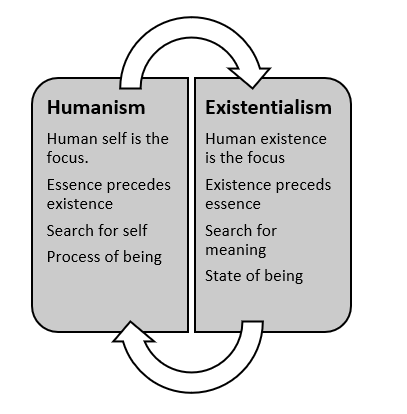
Humanism and Existentialism
Existentialism, on the other hand, is more focused on individual existence, freedom, and choice in a seemingly indifferent or meaningless world. Prominent existentialist psychologists, like Viktor Frankl and Rollo May, emphasized the role of human suffering, death, and isolation. Existential psychology explores the anxiety that arises from the awareness of life’s limitations, including death, and how individuals find meaning despite these challenges. Frankl’s concept of logotherapy argues that the primary drive-in humans is not pleasure, but the search for meaning, especially in difficult situations. Both humanism and existentialism share a focus on the individual’s potential for growth, but existentialism delves deeper into the complexities of life’s inherent struggles.
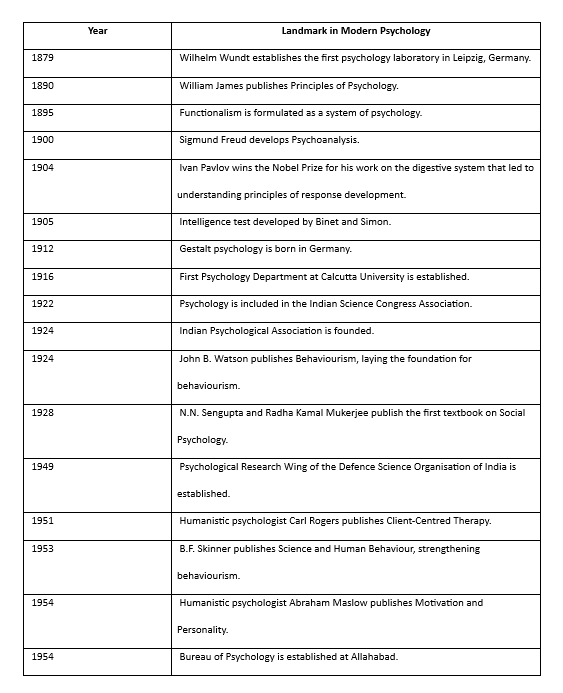
Key Events in the History of Psychology
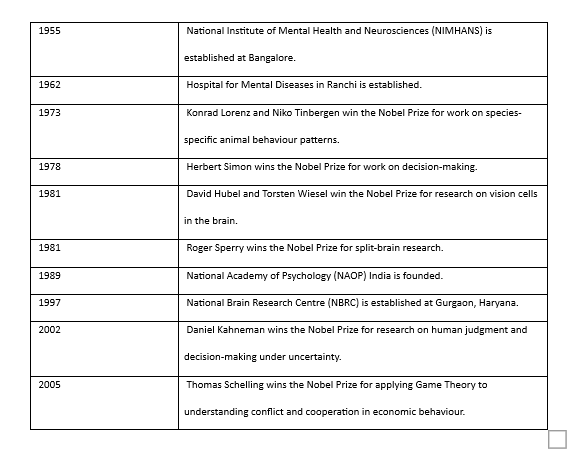
Key Events in the History of Psychology
Contemporary Approaches
Today, psychology is a diverse and interdisciplinary field. Modern psychologists draw on a variety of perspectives, including-
- Biological psychology- which examines the physiological bases of behaviour, such as brain structure and neurotransmitter activity.
- Evolutionary psychology- which explores how evolutionary principles shape behaviour and mental processes.
- Cultural psychology- which emphasizes the role of culture in shaping behaviour and cognition.
- Positive psychology– a recent movement led by Martin Seligman, focuses on strengths and virtues that enable individuals and communities to thrive, rather than merely treating mental illness.
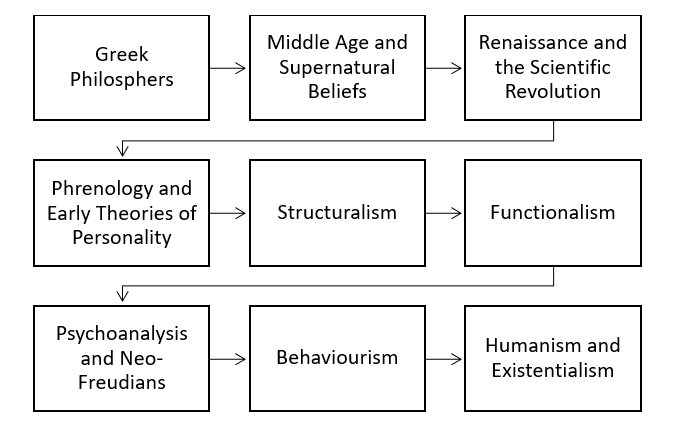
History of Psychology (Recap)
Women in Psychology
Despite significant social barriers, women have played a pivotal role in shaping the field of psychology. Early pioneers like Mary Whiton Calkins, the first female president of the American Psychological Association, made groundbreaking contributions to memory research.
Margaret Floy Washburn was the first woman to earn a PhD in psychology and made notable contributions to the study of animal behaviour. Leta Stetter Hollingworth advanced research in child development and challenged sexist beliefs about women’s intellectual capacities.
Karen Horney provided an alternative view to Freud’s psychoanalysis, emphasizing cultural and social influences on personality rather than biological determinism. Anna Freud, daughter of Sigmund Freud, expanded psychoanalytic theory, especially in the realm of child psychology. These women overcame significant challenges and discrimination, paving the way for future generations of female psychologists.
Indian Psychology
Indian psychology, in the context of the history of psychology, represents a unique blend of ancient philosophical thought and modern psychological practices. Rooted in the Vedic traditions and schools of thought like Vedanta and Buddhism, Indian psychology explores concepts such as *Atman* (the self), Maya (illusion), and Karma (action and its consequences). These ideas laid the groundwork for understanding the mind and consciousness long before the formal establishment of psychology as a scientific discipline in the West.
During the colonial period, Indian scholars began to critically assess Western psychological theories, leading to the emergence of indigenous psychological perspectives. Figures like G. Ramachandran and R. K. Mohanty sought to integrate Western methodologies with Indian philosophical insights, emphasizing the importance of cultural context in psychological research. The establishment of psychology as an academic discipline in India in the late 19th and early 20th centuries marked a significant turning point, with institutions like the Indian Psychological Association facilitating research and practice.
Today, Indian psychology continues to evolve, focusing on mental health issues within culturally relevant frameworks and incorporating practices such as yoga and meditation into therapeutic settings. This historical trajectory highlights India’s contributions to the broader field of psychology and its potential for influencing global psychological practices.
Indian Psychology vs Psychology in India vs Psychology of India
The terms “Indian psychology,” “psychology in India,” and “psychology of India” represent distinct yet interrelated concepts. Indian psychology refers to the indigenous psychological frameworks and practices rooted in ancient Indian philosophical traditions, such as Vedanta and Buddhism. It emphasizes holistic approaches to mental health, self-realization, and the interconnectedness of mind, body, and spirit, often incorporating practices like yoga and meditation.
Psychology in India, on the other hand, pertains to the practice and study of psychology within the Indian context, including the adoption of Western psychological theories and methodologies. This field encompasses the academic and professional landscape of psychology as it has developed in India since the late 19th century, highlighting how Indian scholars and practitioners have adapted global theories to address local cultural and societal issues.
Lastly, psychology of India refers to the academic exploration of psychological phenomena specifically related to Indian culture, society, and behaviour. This perspective analyses how cultural, historical, and social factors shape mental processes and behaviour in India, often focusing on issues like collectivism, familial relationships, and the impact of religion on mental health. Each of these concepts contributes to a comprehensive understanding of psychology as it relates to Indian heritage and contemporary practice.

Psychology and India
Key Issues in Psychology
- Nature vs. Nurture Debate- This debate focuses on whether genetics (nature) or environment (nurture) plays a more significant role in shaping human behaviour. Psychologists explore how traits such as intelligence, personality, and mental health are influenced by biological inheritance versus factors like upbringing, culture, and experiences. While both are acknowledged as important, determining their exact contributions and interaction remains a central question in psychology.
- Free Will vs. Determinism- This debate examines whether individuals have the freedom to make independent choices (free will) or if their actions are determined by external factors like biology, environment, or unconscious drives (determinism). Proponents of free will argue that people are responsible for their actions, while determinists believe that behaviour is shaped by prior causes and is thus predictable.
- Role of Unconscious Processes- Stemming from Freudian and Neo-Freudian ideas, this question explores how unconscious processes, such as hidden motives or automatic responses, influence behaviour. While the exact nature of the unconscious remains debated, psychologists continue to investigate how much of our behaviour is driven by these unrecognized forces.
- Generalizability of Psychological Findings- Much psychological research has historically been conducted on WEIRD (Western, educated, industrialized, rich, and democratic) populations, raising concerns about whether findings can be applied to diverse groups. To address this, researchers are increasingly conducting cross-cultural studies and using more diverse samples to ensure that psychological theories and findings can be applied universally.
Future of Psychology
The future of psychology holds great promise as it continues to evolve in response to ongoing debates and emerging insights. As the field increasingly embraces a multidisciplinary approach, integrating findings from genetics, neuroscience, and cultural studies, it will enhance our understanding of human behaviour in a more holistic manner.
Advances in technology, such as neuroimaging and artificial intelligence, will further refine psychological research methods, allowing for deeper insights into the complexities of the mind.
Additionally, the focus on diversity and inclusion will ensure that psychological theories and practices are more representative and applicable across different populations. As psychology addresses fundamental questions regarding nature versus nurture, free will versus determinism, and the influence of unconscious processes, it will pave the way for more effective interventions and therapies that cater to the nuanced needs of individuals in an increasingly complex world.

Important Psychologists
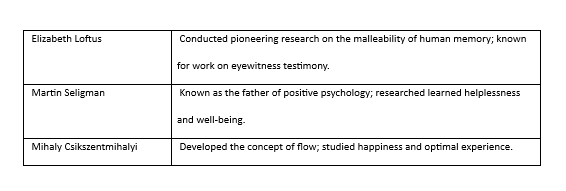
Important Psychologists
References
Benjamin, L. T. (2006). A brief history of modern psychology (2nd ed.). Malden, MA: Blackwell Publishing.
Boring, E. G. (1950). A history of experimental psychology. New York, NY: Appleton-Century-Crofts.
Carole, W. and Carol, T. (2007). Psychology (7th Edition). Pearson Education, India.
Feldman, R. S. (2016). Understanding psychology (12th ed.). New York, NY: McGraw-Hill Education.
Hergenhahn, B. R., & Henley, T. (2013). An introduction to the history of psychology (6th ed.). Belmont, CA: Cengage Learning.
Leahey, T. H. (2013). A history of psychology: From antiquity to modernity (7th ed.). Upper Saddle River, NJ: Pearson.
Wundt, W. (1912). Principles of physiological psychology (Translated by C. H. Judd). New York, NY: Macmillan.
Robinson, D. N. (1995). An intellectual history of psychology. Madison, WI: University of Wisconsin Press.
Subscribe to Careershodh
Get the latest updates and insights.
Join 18,513 other subscribers!
Niwlikar, B. A. (2022, September 15). The History of Psychology- Master Sailing Through the 6 Epoches of Psychology. Careershodh. https://www.careershodh.com/the-brief-history-of-psychology/

I want to join it and downloads something
but it don’t as my wish
What do you want to download ?
thanks your information is helpful
Excellent summary and critical analysis
Excellent summary and critical analysis, thank you